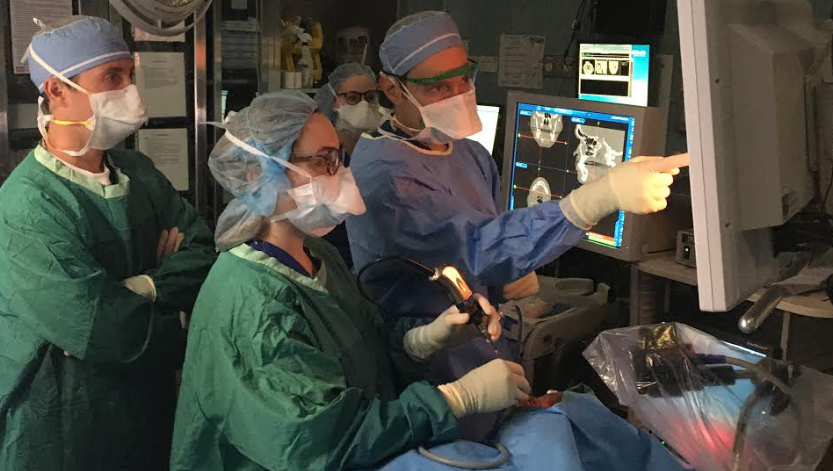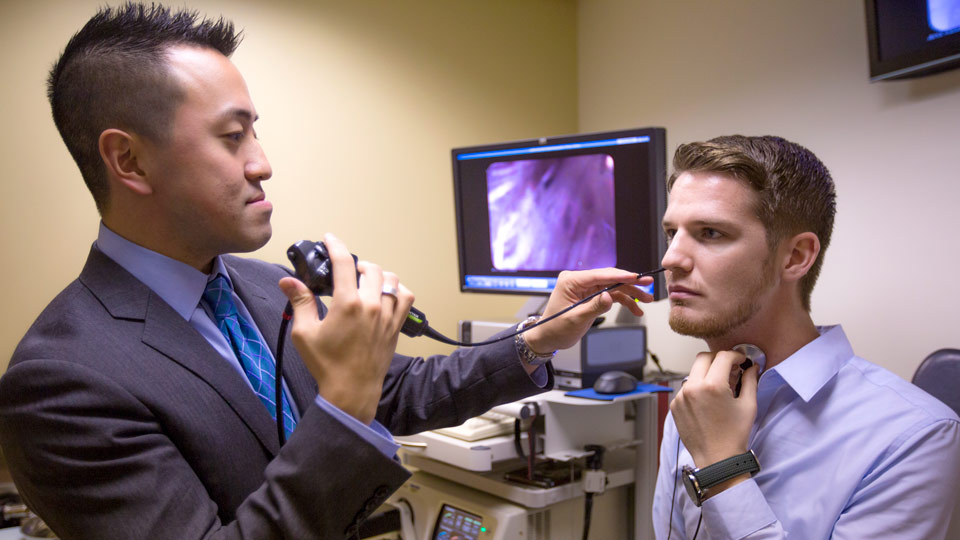In-Depth Look at Otolaryngology and Its Role in Treating Throat Disorders
Wiki Article
Discovering the Field of Otolaryngology: What to Anticipate When You Consult an ENT
Otolaryngology, typically described as ENT, incorporates the diagnosis and therapy of throat, ear, and nose problems. For those experiencing associated problems, seeking advice from an ENT expert can supply clarity and alleviation. Comprehending what to anticipate during such assessments is necessary for reliable interaction and treatment. This overview will describe vital aspects of the ENT experience, including common reasons for visits and the procedures included in diagnosis and treatment.
Recognizing Otolaryngology: A Review
Otolaryngology, commonly described as ENT (Ear, throat, and nose) medication, is a customized branch of medicine that concentrates on the diagnosis and treatment of problems affecting these vital locations of the body. This field includes a wide variety of conditions, including those related to hearing, balance, respiratory system feature, and speech. Otolaryngologists are educated to handle both clinical and medical therapies, utilizing innovative techniques and modern technologies. Their experience extends beyond traditional conditions, resolving problems such as allergies, sinus infections, and hearing loss. In addition, they play an essential duty in the administration of head and neck cancers, providing complete treatment tailored to private client demands. In general, otolaryngology continues to be vital for preserving wellness and top quality of life in damaged people.Typical Reasons to See an ENT Expert
Many people look for the know-how of an ENT professional for a selection of reasons, mirroring the diverse nature of problems that affect the ear, throat, and nose. Common concerns consist of persistent sinusitis, which commonly results in persistent nasal congestion and face pain. Allergic reactions and their linked signs, such as itching and sneezing, likewise motivate sees to these experts (ENT surgery). Hearing loss, whether progressive or abrupt, is an additional substantial reason for examination. On top of that, people may seek examination for throat problems, including persistent hoarseness or ingesting problems. Rest apnea, defined by interrupted breathing during rest, is regularly addressed by ENT specialists also. Each of these problems highlights the value of specialized care in handling intricate ENT-related wellness issues
Planning for Your ENT Appointment
When getting ready for an ENT visit, it is vital to collect appropriate details and consider any details concerns. Individuals ought to assemble a detailed clinical history, consisting of previous ear, nose, or throat issues, surgical treatments, and present drugs. Recording signs and symptoms-- such as duration, regularity, and intensity-- can supply valuable insights for the ENT specialist. Furthermore, individuals ought to prepare a checklist of questions they desire to ask, ensuring that all worries are attended to during the check out. Bringing along any pertinent medical records or examination outcomes can additionally help the ENT in recognizing the patient's problem. Individuals need to verify their visit details, consisting of location, time, and date, to minimize any kind of last-minute complication. Proper preparation can boost the efficiency of the examination and bring about far better end results.What to Expect Throughout the Assessment
As the assessment begins, the client can expect to participate in a detailed discussion with the ENT professional about their symptoms and medical history. The specialist will ask about the period, frequency, and severity of signs such as hearing loss, nasal congestion, or aching throat. Additionally, the individual's previous medical problems, medicines, and any appropriate household history will certainly be examined, assisting the specialist in forming a total understanding of the individual's health. The ENT may additionally ask concerning way of life elements, such as exposure to toxic irritants or irritants. This open discussion develops a structure for the appointment, guaranteeing that the individual's concerns are dealt with and setting the phase for any type of required evaluations or suggestions for therapy.
Diagnostic Tests and Procedures in Otolaryngology
An array of analysis examinations and treatments are vital in otolaryngology to properly assess and diagnose conditions affecting the nose, ear, and throat. Usual examinations consist of audiometry, which gauges hearing function, and tympanometry, assessing center ear pressure. Nasal endoscopy allows visualization of the nasal flows and sinuses, while laryngoscopy checks out the throat and vocal cables. Imaging methods, such as CT scans and MRIs, supply comprehensive sights of head and neck frameworks. Allergic reaction screening might likewise be conducted to identify triggers for sinus or respiratory problems. These analysis tools allow ENT specialists to create a detailed understanding of patients' conditions, guaranteeing customized and reliable management plans. Correct medical diagnosis is essential for effective treatment results in otolaryngology.Therapy Options Supplied by ENT Specialists
ENT professionals supply a selection of treatment options tailored to deal with specific problems impacting the nose, ear, and throat. These therapies vary from traditional strategies, such as medication and lifestyle adjustments, to more intrusive procedures. As an example, allergies may be handled with antihistamines or immunotherapy, while persistent sinus problems may require nasal corticosteroids or sinus surgery. For hearing loss, ENT experts typically recommend hearing help or surgical treatments like cochlear implants. In cases of throat disorders, options can include speech therapy or operations to eliminate obstructions. Furthermore, they may offer guidance for taking care of sleep apnea, including the use of CPAP tools or surgical interventions. In general, the goal is to enhance individuals' high quality of life with customized treatment ENT Doctor and reliable treatment methods.When to Seek Follow-Up Care With an ENT
When to look for follow-up treatment with an ENT specialist is important for taking care of ongoing signs and symptoms or problems associated to ear, nose, and throat problems, identifying. People need to think about arranging a follow-up consultation if signs and symptoms persist in spite of first treatment, such as persistent ear discomfort, nasal congestion, or throat pain. Modifications in hearing, balance problems, or unusual nasal discharge might additionally warrant more assessment. Additionally, if an individual experiences negative effects from suggested drugs or has undertaken a surgery, follow-up treatment is vital to check recuperation and attend to any kind of concerns. Timely assessments can assure effective management of conditions, avoid possible issues, and give comfort pertaining to one's wellness. Seeking follow-up treatment promotes positive health management in otolaryngology.Often Asked Questions

What Qualifications Should I Try to find in an ENT Specialist?
When seeking an ENT professional, one need to look for board qualification, relevant experience, and solid patient reviews. Furthermore, efficient interaction abilities and a caring technique can significantly enhance the overall therapy experience.How Do I Pick the Right ENT for My Demands?
Choosing the ideal ENT expert includes evaluating their credentials, experience, and client reviews (ENT Clinic). It is vital to consider their communication style and approach to therapy, ensuring they align with the person's particular health requirements and choicesAre There Any Kind Of Dangers Connected With ENT Procedures?
The threats connected with ENT treatments might consist of infection, blood loss, anesthesia difficulties, and potential damage to bordering frameworks. Individuals should talk about these risks with their medical professional to recognize specific concerns and assurance informed choices.Exactly How Can I Manage Anxiousness Before My ENT Appointment?
To handle anxiety before a consultation, individuals can practice deep breathing exercises, envision positive outcomes, prepare inquiries beforehand, and look for support from friends or family members, fostering a sense of reassurance and peace.What Should I Do if I Experience Side Results From Therapy?
The individual must without delay report them to their health care supplier if side results from treatment occur. Modifications to therapy or added interventions might be required to ensure safety and security and performance in managing their condition - ENT surgery. As the consultation starts, the person can anticipate to involve in a detailed discussion with the ENT specialist concerning their signs and symptoms and medical background. These analysis devices allow ENT professionals to create a complete understanding of individuals' problems, guaranteeing customized and efficient management strategies. ENT professionals offer a variety of treatment options tailored to deal with specific problems impacting the throat, ear, and nose. When seeking an ENT expert, one need to look for board qualification, relevant experience, and strong client evaluations. Selecting the appropriate ENT specialist includes evaluating their qualifications, experience, and client reviewsReport this wiki page